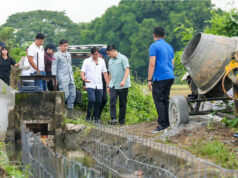DAVAO CITY — Chelsea Logistics Holdings Corp. of the Udenna Group laid down the timeline for the awarding process for the Davao International Airport (DIA) rehabilitation contract, including a Swiss challenge to its unsolicited proposal later this year and contract signing by January.
Manuel T. Jamonir, assistant vice president of Udenna Infrastructure Corp., said the group expects several companies to participate in the Swiss challenge, possibly by the third quarter.
“If there is a challenger, we have the right to match. It’s not automatic but we have to review the proposals from the challengers (and act accordingly) depending on the results of the review,” Mr. Jamonir said during the Habi at Kape forum.
Udenna Infrastructure, a wholly-owned subsidiary of Udenna Corp., is providing technical support to Chelsea Logistics for the project, which has an estimated investment cost of P48.8 billion.
Chelsea Logistics has been awarded Original Proponent Status for its proposal that includes the development, operation and management of DIA over a concession period of 30 years.
Based on Chelsea Logistics’ project timeline, it expects to get approval for its proposal from the National Economic and Development Authority (NEDA) by July, and the submission of comparative bids by October. The Notice of Award is expected before the end of the year and contract signing by January.
“The project is now with NEDA technical board composed of the Department of Transportation (DoTR) and CAAP (Civil Aviation Authority of the Philippines) and is currently being evaluated. We received the comments from NEDA (interagency committee) last Monday and we are now preparing our response… These are related to the concession agreement,” he said.
Under the proposal, Chelsea Logistics forecasts passenger traffic to hit 15.5 million by 2050. In 2018, DIA throughput was 4.4 million passengers.
“Davao airport is the third-busiest airport in the country but it lags behind in terms of international traffic,” Mr. Jamonir said.
To increase international traffic, the proponent plans to partner with an airport operator with an international network to facilitate new-route development. It will also work with the government to develop new routes within the Association of Southeast Asian Nations.
The master development plan for DIA, which covers 209 hectares, calls for the construction of a parallel taxiway, reconfiguration and expansion of the passenger terminal building, land-side and air-side improvements, and introduction of new airport technology to enhance the passenger experience.
The development will be executed in three phases, with Phase 1 targeted to start next year covering the rehabilitation and expansion of the passenger terminal building and the construction of a new cargo terminal building, among others. — Maya M. Padillo



